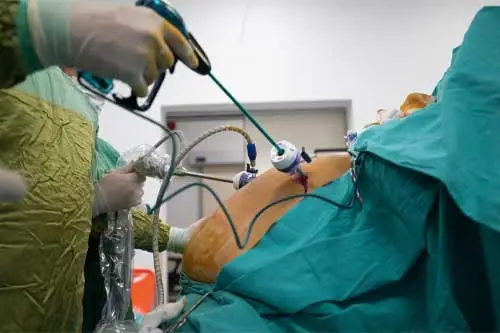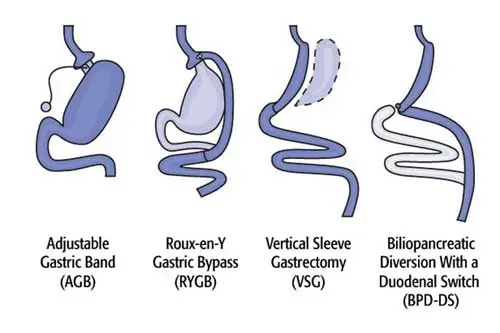Introduction:
Weight loss surgery, also termed bariatric surgery, has evolved into a prominent intervention for individuals facing obesity challenges and the associated health complications. While traditional weight loss strategies like diet modifications and physical activity remain fundamental, they may not yield sufficient outcomes for everyone. In such scenarios, weight loss surgery presents itself as a compelling alternative. By undergoing various surgical procedures aimed at restructuring the digestive system, patients can witness substantial weight reduction and improvements in their overall health. However, it’s imperative to delve deeper into the realm of weight loss surgery, comprehending its diverse procedures, potential benefits, risks, and suitability for different individuals based on their medical history and weight loss goals.
Understanding Weight Loss Surgery
Weight loss surgery encompasses a variety of procedures aimed at reducing the size of the stomach or limiting the absorption of nutrients, leading to significant weight loss. The most common types of weight loss surgery include gastric bypass, gastric sleeve, gastric banding, and biliopancreatic diversion with duodenal switch (BPD/DS). Each procedure works differently but ultimately serves the same purpose: to help individuals lose weight and improve their overall health.
Who is a Candidate for Weight Loss Surgery?
Weight loss surgery is often suggested for individuals with a body mass index (BMI) of 40 or higher, or a BMI of 35 or higher accompanied by obesity-related medical conditions like type 2 diabetes, hypertension, or sleep apnea. These criteria are essential as they indicate the severity of obesity and the potential health risks associated with it. Moreover, candidates must have made sincere attempts at conventional weight loss methods, such as dieting and exercising, demonstrating their dedication to managing their weight. Furthermore, readiness to embrace significant lifestyle modifications post-surgery is crucial for long-term success. This includes adhering to dietary guidelines, adopting regular exercise routines, attending follow-up appointments, and addressing any psychological or behavioral factors that may impact weight management. Overall, weight loss surgery is most effective when combined with a comprehensive approach that encompasses both surgical intervention and lifestyle changes.
The Surgical Process
Before undergoing weight loss surgery, patients undergo a thorough evaluation to assess their overall health and readiness for the procedure. This may include physical examinations, laboratory tests, and consultations with various healthcare professionals, including surgeons, dietitians, and psychologists. Once deemed suitable, patients undergo the surgical procedure, which is typically performed laparoscopically, resulting in smaller incisions and faster recovery times.
Post-Surgery Lifestyle Changes
Weight loss surgery serves as a catalyst for initiating a healthier lifestyle, but it’s crucial to recognize that it’s not a shortcut to achieving sustainable weight loss. Success after surgery hinges on patients’ commitment to implementing substantial lifestyle modifications. Central to this commitment is adopting a balanced and nutritious diet, which often involves portion control, choosing nutrient-dense foods, and minimizing processed and high-calorie options. Additionally, regular physical activity is paramount for maintaining weight loss and improving overall health. Patients are encouraged to incorporate exercise into their daily routine, whether it’s through structured workouts, recreational activities, or simply staying active throughout the day.
Moreover, attending follow-up appointments with healthcare providers is essential for monitoring progress, addressing any post-operative issues, and ensuring optimal health outcomes. These appointments allow healthcare professionals to assess weight loss progress, adjust treatment plans as needed, and provide ongoing support and guidance. Beyond the physical aspects, it’s equally important for patients to address any emotional or psychological challenges that may surface during their weight loss journey. This may involve seeking counseling or support groups to navigate issues such as body image concerns, relationship changes, or coping with stressors. Ultimately, long-term success after weight loss surgery requires a holistic approach that encompasses not only physical changes but also emotional well-being and psychological resilience.
Benefits and Risks
Weight loss surgery holds the potential for transformative health benefits that extend far beyond mere weight reduction. For many individuals grappling with obesity, undergoing bariatric surgery can herald significant improvements in obesity-related health conditions, such as type 2 diabetes, hypertension, and obstructive sleep apnea. These positive outcomes often translate into a notable enhancement in overall quality of life, as patients experience newfound energy, mobility, and vitality. By effectively addressing underlying health issues, weight loss surgery empowers individuals to reclaim control over their well-being and enjoy a fuller, more active lifestyle.
Nevertheless, it’s imperative to acknowledge that weight loss surgery, like any surgical intervention, is not without its inherent risks and potential complications. Patients must be cognizant of the possible adverse outcomes, which may include infection, bleeding, and nutritional deficiencies. Prior to undergoing surgery, individuals are strongly advised to engage in comprehensive discussions with their healthcare providers to fully understand the associated risks and benefits. This collaborative approach ensures that patients are equipped with the knowledge and support necessary to make informed decisions about their treatment journey. Ultimately, by carefully weighing the potential benefits against the risks and adhering to post-operative guidelines, patients can maximize the likelihood of achieving favorable outcomes and long-term success following weight loss surgery.
Kinds of Weight Loss Surgery
Gastric Bypass Surgery
Gastric bypass surgery, also known as Roux-en-Y gastric bypass (RYGB), is one of the most common and effective weight loss procedures.
During this procedure, the surgeon creates a small pouch at the top of the stomach, effectively reducing its size. This pouch is then connected directly to the small intestine, bypassing a portion of the stomach and the upper part of the small intestine.
By reducing the size of the stomach and bypassing a portion of the intestine, gastric bypass surgery restricts the amount of food you can eat and reduces the absorption of calories and nutrients, leading to significant weight loss.
Gastric Sleeve Surgery
Gastric sleeve surgery, also known as sleeve gastrectomy, involves the removal of a large portion of the stomach, leaving behind a smaller, sleeve-shaped stomach.
This procedure restricts the amount of food you can eat by reducing the size of the stomach and decreasing the production of hunger-inducing hormones.
Gastric sleeve surgery does not involve rerouting the intestines, making it a simpler procedure with potentially fewer complications compared to gastric bypass surgery.
Adjustable Gastric Banding
Adjustable gastric banding, commonly known as the Lap-Band procedure, involves placing a silicone band around the upper part of the stomach to create a small pouch.
The band is adjustable and can be tightened or loosened over time to control the flow of food into the stomach.
Unlike gastric bypass and sleeve surgery, gastric banding does not involve cutting or stapling the stomach or rerouting the intestines. It is a reversible procedure, and the band can be removed if necessary.
Biliopancreatic Diversion with Duodenal Switch (BPD/DS)
Biliopancreatic diversion with duodenal switch (BPD/DS) is a more complex weight loss surgery that involves two steps.
In the first step, a portion of the stomach is removed to create a smaller stomach pouch. Then, a large portion of the small intestine is bypassed, limiting the absorption of calories and nutrients.
BPD/DS results in significant weight loss and is often recommended for individuals with severe obesity or obesity-related health conditions.
Intragastric Balloon
Intragastric balloon placement is a non-surgical weight loss procedure that involves placing a deflated silicone balloon into the stomach via endoscopy.
Once in place, the balloon is filled with saline solution, expanding in the stomach and creating a feeling of fullness.
The balloon remains in the stomach for a predetermined period, typically six months, before being removed. It is often used as a temporary measure to jumpstart weight loss in individuals who are not candidates for surgery or as a preoperative tool to help individuals lose weight before undergoing more invasive procedures.
These are just a few examples of the many weight loss surgery options available today. Each procedure has its own unique benefits, risks, and considerations, and it is essential to consult with a qualified healthcare provider to determine the best option for your individual needs and goals.
Weight loss surgery in Antalya
Weight loss surgery, also known as bariatric surgery, has gained popularity worldwide, including in Antalya, Turkey. Antalya, renowned for its stunning Mediterranean coastline and vibrant culture, has emerged as a sought-after destination for medical tourism, offering top-notch healthcare facilities and skilled medical professionals specializing in various fields, including bariatric surgery.
Individuals considering weight loss surgery in Antalya can benefit from access to state-of-the-art hospitals equipped with advanced technologies and modern amenities. Moreover, many healthcare facilities in Antalya cater to international patients, providing comprehensive services tailored to their unique needs, including assistance with travel arrangements, accommodation, and language interpretation.
Bariatric surgery in Antalya encompasses various procedures, such as gastric sleeve surgery, gastric bypass surgery, and gastric banding, each designed to facilitate significant weight loss and improve overall health outcomes. These procedures are performed by experienced bariatric surgeons who adhere to international standards of safety and efficacy, ensuring optimal results for patients.
Furthermore, undergoing weight loss surgery in Antalya offers several advantages, including cost-effectiveness compared to many Western countries, shorter waiting times for surgery, and the opportunity to combine medical treatment with a relaxing vacation in a picturesque setting. Additionally, patients can expect personalized care and ongoing support from multidisciplinary healthcare teams throughout their weight loss journey.
However, individuals considering weight loss surgery in Antalya should conduct thorough research and consult with qualified healthcare providers to determine the most suitable treatment option based on their medical history, weight loss goals, and overall health status. By choosing reputable medical facilities and experienced surgeons, patients can embark on their weight loss journey with confidence, knowing they are in capable hands in the beautiful city of Antalya. You can contact Medgol via WhatsApp and ask for more information.
Conclusion
Weight loss surgery can be a life-changing option for individuals struggling with obesity and its associated health issues. By understanding what weight loss surgery entails, who it is suitable for, and the lifestyle changes required for success, individuals can make empowered decisions about their health and well-being. If you’re considering weight loss surgery, be sure to consult with a qualified healthcare provider to explore your options and determine the best course of action for your unique needs.
FAQs
What is weight loss surgery?
Weight loss surgery, also known as bariatric surgery, is a surgical procedure designed to help individuals lose weight by restricting the amount of food the stomach can hold, reducing the absorption of nutrients, or a combination of both. These surgeries are typically recommended for individuals who are severely obese and have not been successful with other weight loss methods.
Who is a candidate for weight loss surgery?
Candidates for weight loss surgery generally have a body mass index (BMI) of 40 or higher, or a BMI of 35 or higher with obesity-related health conditions such as type 2 diabetes, high blood pressure, or sleep apnea. Candidates should also have attempted other weight loss methods without success and be committed to making lifestyle changes post-surgery.
What are the different types of weight loss surgery?
There are several types of weight loss surgery, including gastric bypass surgery, gastric sleeve surgery, adjustable gastric banding, biliopancreatic diversion with duodenal switch (BPD/DS), and intragastric balloon placement. Each procedure works differently to help individuals lose weight and may have different benefits and risks.
What are the potential risks and complications of weight loss surgery?
While weight loss surgery can be effective for many individuals, it is not without risks. Potential complications may include infection, bleeding, blood clots, leaks at surgical sites, gastrointestinal issues, nutrient deficiencies, and gallstones. It’s essential for individuals considering weight loss surgery to discuss these risks with their healthcare provider.
What lifestyle changes are necessary after weight loss surgery?
Weight loss surgery is a tool to help individuals lose weight, but it requires significant lifestyle changes to be successful. After surgery, patients will need to follow a strict diet plan, engage in regular physical activity, attend follow-up appointments with their healthcare provider, and make long-term changes to their eating habits. It’s crucial to have a support system in place to help navigate these changes and maintain weight loss over time.



